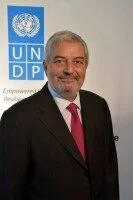Magdy Martínez-Solimán: Statement delivered at Partnerships for Inclusive Growth: Private sector investment in the SDGs
His Excellency Mr. Ahmet Yıldız, Deputy Minister of Foreign Affairs of Turkey, Distinguished Speakers, Colleagues and Friends,
The SDGs represent an unprecedented global consensus to align our efforts for the next 13 years on a comprehensive and ambitious development agenda for people and the planet. This level of ambition now needs to be matched with the necessary resources, innovation capacity and partnerships to drive implementation.
The private sector, in this context, is an indispensable partner. In developing countries, private sector operations constitute 60 percent of GDP, while generating 90 percent of jobs and 80 percent of capital inflows. The private sector further contributes to development by providing goods and services, financing social and economic investments through taxes, and creating innovative solutions to help tackle development challenges.
It is important to recognize that the private sector is extremely diverse and not defined only by multinational corporations and industry giants. Unleashing the transformative capacity of the private sector for development is not possible without small and medium enterprises (SMEs) and social enterprises. SMEs create over 50 percent of formal jobs globally. I emphasize “formal” – conventional assumptions wrongly equate small business with informality!
They also offer innovative development solutions to transform local communities, like better education, enhanced health services and improved access to clean water and energy.
To advance the work and role of the private sector in development, UNDP partnered with the Government of Turkey to establish the Istanbul International Center for Private Sector in Development (IICPSD) in 2011. The Istanbul Center advises governments on how mobilize private capital and works with business to contribute to the SDGs through their operations.
We see a clear business case for the private sector to invest in SDG implementation. By developing new offerings of products and services, meet the demands of the base of the pyramid (making people with less than US$10 per day in purchasing power, access to markets) and by investing in sustainable approaches in areas such as agriculture, cities, energy and health, new economic opportunities of up to US$12 trillion could be generated.
The good news is that many companies are already doing this successfully. Take the 200 companies that are members of the Business Call to Action (BCtA) platform hosted by the Istanbul Center. These companies have collectively pledged to provide access to financial services for 59 million people, improve health for 63 million and enhance access to energy for 90 million low-income households.
For example:
Turkey’s Pinar Dairy accounts for 20 percent of total dairy exports. While industry peers source primarily from large farms, Pinar sees value in sourcing from small-scale suppliers. By assisting 3,500 dairy suppliers with feed and other inputs for milk production, and providing training on animal health, feeding and sanitation, Pinar is increasing the productivity and incomes of its small-scale dairy farmers by simultaneously increasing milk yields and reducing milk costs per litre for farmers.
In Pakistan, 77 out of 100 Pakistanis do not have access to reliable electricity. Ten million live off-grid in rural areas.BCtA member Nizam Energy is working towards a true transformation for these communities by offering affordable solar energy and pay-as-you-go solutions to 200,000 low-income families. By 2020, Nizam Energy aims to reach 1 million off-grid rural lives in Pakistan, support 25,000 local micro entrepreneurs as sales agents and train 500 technicians to provide last-mile support. Nizam Energy is now expanding to Sub-Saharan Africa, aiming to provide energy to millions more low-income rural families.
This raises my second point: for companies to fully embrace the SDGs, an enabling environment that encourages innovation, and better values inclusion and sustainability, is also needed. This requires innovative public policy and legislative reforms, informed by multi-stakeholder policy dialogue.
During the Turkish Presidency of G20, the Istanbul Center, together with the World Bank, supported the development of the G20 Inclusive Business Framework.
The Framework supports challenge funds, which aims to increase access to finance for inclusive businesses by providing competitive funding for social enterprises or small businesses contributing to development. UNDP implements a successful challenge fund in Malawi, which invests in agriculture companies for the export market. This kind of instrument, tax incentives, subsidies and regulations will expand the scale and scope of private sector contributions to SDG partnerships, recognized under SDG 17.
Public-Private Partnerships like the SDG 3 Platform in Kenya are also paving the way. The Governments of Kenya, the Netherlands, USA and Germany partnered with several United Nations agencies, private sector companies including Philips, Unilever and Safaricom, and civil society to improve primary healthcare. To achieve its goal, the SDG 3 Platform aims to unlock up to US$1 billion of public-private partnership investments into primary health care in Kenya by 2021. The platform is a remarkable achievement in convening different stakeholders for collective action towards the Global Goals.
Conclusion
In conclusion, let me reiterate that the SDGs will only be achieved if they are deeply embedded into economic policies and into strategies and operations of all businesses. The fundamental premise of Agenda 2030 is that long-term economic development and prosperity depends upon social and environmental sustainability. Conversely, achieving social and environmental sustainability requires poverty reduction and economic growth. These goals are interlinked and indivisible. Business needs development and development needs business.
At UNDP, we are fully committed to strengthen and advance our collaboration with Turkey on these issues, through the Istanbul Center, as well as with other Member States, companies and investors.
Thank you very much for your attention.
You can also read the statement in full on the UNDP website.

